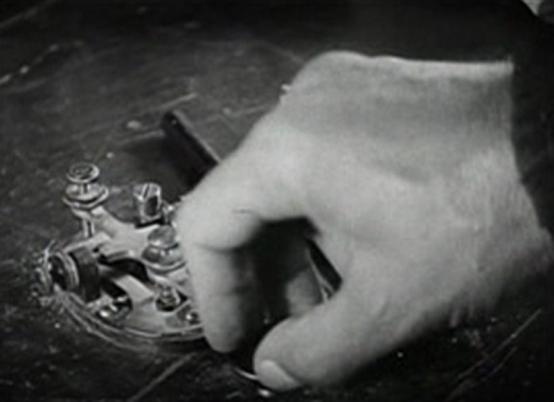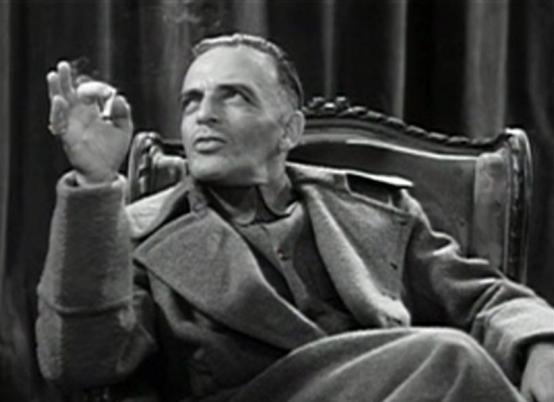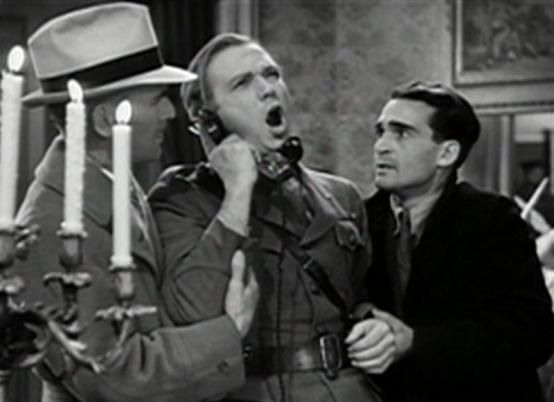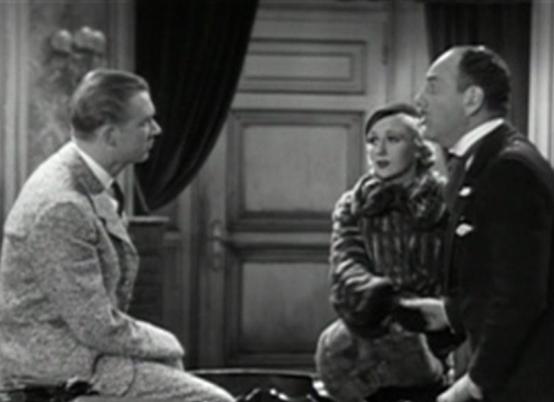This post was written for the Journalism in Classic Films blogathon being hosted by Comet Over Hollywood and Lindsay’s Movie Musings. Visit their sites for links to all contributors.
Lee Tracy had scored on Broadway back in 1928 when he originated the role of Hildy Johnson in the classic Ben Hecht-Charles MacArthur newspaper yarn The Front Page. By the time of Clear All Wires! the blusterous Tracy had already played several motormouthed newspapermen on the screen as well.
Tracy’s collection of movie journalists in 1932 included his parts in The Strange Love of Molly Louvain, Love Is a Racket and Doctor X. He got to be even a bit more obnoxious as a gossip columnist in Blessed Event. By the end of that same year he’d graduated to politician in Washington Merry-Go-Round and press agent in The Half Naked Truth, two movies I’ve previously written about, but MGM cast their brand new contract player back in the field as a foreign correspondent for the Chicago Globe in his first release of the New Year, 1933’s Clear All Wires!
“I am the newspaper business. I’m news,” Tracy’s Buckley Joyce Thomas tells rival correspondent Pettingwaite of the Times. “I disappear for a week and all America boils. Millions of people out there, waiting for me, praying for me. I’m ‘umble at the very thought of it, but Pettingwaite-I’m the only color in the lives of the masses. I’m a public benefactor.”
Pettingwaite, who knows Buckley Thomas’ tricks too well, sternly replies: “You’re a public enemy. You’re a fake and fraud and if I can ever expose you I will.”
Producer Herman Shumlin had brought Clear All Wires to the Times Square Theater in September 1932. The play was written by husband and wife team Sam and Bella Spewack, profiled in brief at the beginning of my post about The Solitaire Man (1933). The Spewacks are best remembered today for writing Kiss Me Kate in the late 1940s, but the authors of Clear All Wires had gotten their own start in newspapers and spent the better part of the 1920s, after their 1922 marriage, working as foreign correspondents for New York newspapers.
Clear All Wires ran 93 performances on Broadway that fall, during the depths of the Great Depression, but seemed to arouse more interest in the press than with the public. Speculation has it that the Spewacks’ creation, Buckley Joyce Thomas of the Globe, was based on a combination of legendary journalists Floyd Gibbons and Richard Harding Davis, though it wouldn’t surprise me if the fictional Thomas were just a composite of the Spewack’s many period peers or, perhaps, based on their own experiences. Bella Spewack, after all, first rose to fame with her coverage of Anna Anderson’s claims to be Grand Duchess Anastasia, who had been executed with the rest of the Romanov royal family in 1918.
The specter of the Romanovs figures in the main plot of the Spewack’s satirical comedy, Clear All Wires. The film, director George W. Hill’s last completed before his 1934 suicide, opens with an introductory scene in Morocco, establishing Buckley Thomas as a reporter who would do anything to get a story, before moving to a brief interlude in Paris, establishing Thomas as romantically involved with his publisher’s young girlfriend (Una Merkel). It then plants itself in present-day Russia for the remainder of its 78 minutes.
Clear All Wires! takes place at a time when the Soviets were actively forging ties with Western governments. America viewed Stalin warily, but by November 1933 President Roosevelt had officially recognized him and his Communist government.
Buckley Joyce Thomas, a fictional product of 1932, is going to Russia for the fifteenth anniversary of the Russian Revolution. He plans to review the Red Army, get the first real interview with Stalin and the first interview of any kind with the head of the GPU, “the most feared man in all of Russia.” The GPU by this point was actually the OGPU or, by more common parlance, the Soviet secret police, which by the 1950s had evolved into the Cold War era KGB. In Clear All Wires! C. Henry Gordon plays the head of the organization, but we don’t see him until later in the movie.
With that little bit of history behind us we can better understand the story, action and comedy within Clear All Wires!, though I suspect this movie was better appreciated in its own time. That said, period reviews were generally kind to Lee Tracy and other cast members, but mixed when it came to the movie as a whole. In New York the World-Telegram called Clear All Wires! “only fair-to-middling” while the Sun said “it will satisfy a talkie audience, even though it won’t excite it terribly.” The Herald-Tribune said it was “definitely less colorful and atmospheric than was the play,” and Mordaunt Hall of the Times agreed, writing that “it is a good picture with several humorous incidents, but it lacks the sharpness of the play.”
Hall did heap praise on star Lee Tracy though, comparing this performance favorably to a few of his films I mentioned by title above: “So far as Mr. Tracy’s performance is concerned, it is quite as clever as his portrayals of a Congressman, a columnist, a Mayor and a publicity expert.”
When MGM originally purchased Clear All Wires! it was intended for John Barrymore with plans for Jimmy Durante to play his sidekick and assistant, Lefty. They hired the Spewacks to adapt their own play and wound up casting James Gleason as Lefty with new contract player Lee Tracy in the lead.
This pair soon settle into a Moscow hotel room, stolen out from under rival Pettingwaite (Alan Edwards) thanks to the hotel clerk’s (Akim Tamiroff) willingness to accept a hefty bribe.
As Pettingwaite storms out, Buckley asks, “Did you tell the foreign office here that I was a son of a—”
“I did,” Pettingwaite interrupts.
“Good,” says, Buckley. “Then I won’t have to prove it myself.”
Lefty directs Kastya (Ari Kutai), an assistant also appropriated from Pettingwaite, to gather the group of citizens that his boss has requested: a peasant, a worker and a new woman. The peasant and the new woman are quickly dismissed, but the worker, Sozanoff (John Bleifer), will eventually figure in Buckley Thomas’ big story.
After the worker rants about leading the next Russian Revolution and claiming to be the “most wanted man in Russia,” Buckley tells him that none of that is news. He has to make news if he wants to be news. Buckley asks him how many men he has, and Sozanoff says six, but they’re all in jail.
“Then you can’t bomb the Kremlin. Took a look at it flying in, it’s more than a one-man job,” Buckley says. “But I’m telling you right now, a good attempt at an assassination is sure-fire.” Sozanoff leaves vowing to do something to get Buckley’s attention.
“He’s a nut,” Lefty says.
“Nuts make news,” Thomas replies.
Thomas also has plans for romance while on this job with his publisher’s young protege, Dolly (Una Merkel), soon joining him in Moscow and providing the raciest lines of this pre-Code comedy. “Do they call that a bed?” Dolly asks after poking her head in the bedroom. In lines that the New York State censors would cut she continues, “Oh Bucky, that bed will never do, I like a nice big bed, don’t you?” She adds, “I won’t be in the way, Bucky, honest I won’t. I’m lonesome. Let me stay.” They’re not married and she’s not talking about two beds.
Prior to Dolly’s arrival Kate (Benita Hume), the “best newspaperwoman west of the Atlantic ocean,” reunites with Thomas, who asks her to look after Dolly for him once she arrives. Kate is crestfallen. It’s immediately apparent that she’s in love with Buckley herself, but she keeps those feelings bottled up and tries to play good sport.
 The lovely British actress Benita Hume was making her Hollywood debut as Kate, the lovely British newspaperwoman, in Clear All Wires! Hume soon returned to England where she appeared in Alexander Korda’s The Private Life of Don Juan and opposite Conrad Veidt in Jew Süss (both 1934) for Gaumont British. She came back to MGM in Hollywood for titles such as The Garden Murder Case, a Philo Vance mystery; Suzy, which saw her as Jean Harlow’s nemesis; and Tarzan Escapes (all 1936), where she was one of Jane’s cousins. But Hume is best remembered for her marriages. She widowed Ronald Colman in 1958 after nearly twenty years together and married George Sanders less than a year later. Sanders was at her bedside when Benita Hume died in 1967.
The lovely British actress Benita Hume was making her Hollywood debut as Kate, the lovely British newspaperwoman, in Clear All Wires! Hume soon returned to England where she appeared in Alexander Korda’s The Private Life of Don Juan and opposite Conrad Veidt in Jew Süss (both 1934) for Gaumont British. She came back to MGM in Hollywood for titles such as The Garden Murder Case, a Philo Vance mystery; Suzy, which saw her as Jean Harlow’s nemesis; and Tarzan Escapes (all 1936), where she was one of Jane’s cousins. But Hume is best remembered for her marriages. She widowed Ronald Colman in 1958 after nearly twenty years together and married George Sanders less than a year later. Sanders was at her bedside when Benita Hume died in 1967.
While Kate is skeptical of Buckley’s latest paramour, Buckley swears he’s on the level about Dolly: “This isn’t sex, this is love,” he tells her. Kate departs trying to hide how hurt she is after Eugenie, another past conquest of Buckley’s, arrives to welcome him back to Russia.
Lya Lys, who had feminine leads in Luis Buñuel’s L’Age d’Or (1930) behind her in Europe and Anatole Litvak’s Confessions of a Nazi Spy (1939) ahead of her in Hollywood, has this small role as one of Buckley’s past lovers who wouldn’t mind rekindling that fire despite her marriage of convenience to Prince Alexander. The Prince, a Romanov by distant marriage ties, had to marry a Russian to gain entrance back to his homeland, where he hope to be able to die one day. He and his wife, Eugenie, assure Buckley that she’s all his anytime he wishes.
After Buckley has Lefty steal Pettingwaite’s pass for mingling with Stalin at the anniversary ceremony, Pettingwaite gets his revenge by wiring back home about Buckley’s actions and getting the Globe reporter fired for “conduct unbecoming a gentleman.”
Back at the hotel Buckley is stunned by the news and tells Lefty how important the newspaper was to him:
“I’ve lied, cheated, stolen for that cock-eyed paper. I’ve gone hungry for that paper. Slept in the mud for that paper because it was my paper. A paper I was helping to create. To make a better paper than any other newspaper in the entire world. That crummy sheet was home. It was life, life itself, to me. I could have been rich if I quit. I had opportunities. But I wouldn’t. I loved that piece of pulp too much to leave it. It had me hog-tied. And glad of it. Now, what do I get for it?”
Buckley and Lefty plot to come up with a story so fantastic that the paper has to take him back. Lefty suggests they steal Lenin’s corpse from the mausoleum. “Too gruesome, too macabre,” Buckley says. Instead he comes up with the idea of an attempted assassination. “You’ve got to have a name,” he says, mourning that Stalin is surrounded by too many soldiers and that Trotsky is in Turkey. Lenin’s obviously out. But the Prince! Eugenie’s husband with Romanov ties.
“Prince Alexander will be shot and fatally wounded. Here tonight!” Buckley declares. “Everybody in America’s heard of the Romanovs; nobody’s heard of Stalin.”
This is when Clear All Wires! becomes especially shaky. Gleason’s Lefty is a bit too focused on making a target of a certain chair that is soon seating not Prince Alexander but C. Henry Gordon’s head of the secret police. Pettingwaite, the Times reporter, interferes once more and seems a bit too happy to see his rival taken into custody by Gordon’s secret police, while a chance meeting with Sozanoff, the worker, behind bars leads to a confusing ending.
Photoplay featured Clear All Wires! amongst their choices of best films of the month inside their April 1933 issue. Other titles chosen were Topaze, Men Must Fight, Private Jones, State Fair, The Great Jasper, Secrets, From Hell to Heaven and The King’s Vacation. Stars Lee Tracy and Una Merkel were also individually honored amongst “The Best Performances of the Month” inside that same issue of the popular fan magazine.
Clear All Wires! features several lines of racy dialogue, quite a few political jokes, best described as edgy, and Lee Tracy spouting lines a mile a minute in a part that is, for him, familiar and comfortable territory. Yet the movie is a bit flat overall.
Its stage roots show in the static settings and Gleason’s comedy would have been better performed had they stuck with their original choice of Durante, whose presence would have provided a more obvious wink from the material. Una Merkel is the most enjoyable of the actresses while the others, Benita Hume and Lya Lys, each wind up underdeveloped. Hume, especially, should have had a much stronger presence. The twisty ending is predictable, yet so rushed and sloppy that it’s not immediately obvious.
Clear All Wires! was just too distant for me. The situation and the characters, none of whom I could really care about, were too far out to grasp. I probably would have enjoyed an entirely different movie about Una Merkel’s youthful gold digger more than I did Lee Tracy’s adventures on Soviet soil. Clear All Wires! is interesting, but my tone is more quizzical than excited when I say that.
Clear All Wires! is available as a Made to Order DVD-R from the Warner Archive shop.
Please visit Journalism in Classic Film blogathon host sites Comet Over Hollywood and Lindsay’s Movie Musings for links to all contributors.
[phpbaysidebar title=”Stars of Clear All Wires! on eBay” keywords=”Lee Tracy,Una Merkel,Benita Hume” category=”45100″ num=”5″ siteid=”1″ sort=”EndTimeSoonest” minprice=”39″ maxprice=”599″ id=”2″]















Thanks for the detailed background on this interesting, clearly off-beat, movie. Great post.
Thanks, Jacqueline. That darned background made me about 24 hours late to the Blogathon party, so I was crossing my fingers it worked! Extremely off-beat. I wanted to like it more (I’m a Tracy fan), but it glazed me over in a few spots.
PS: One bit of background I left out–Tracy’s part was played by Thomas Mitchell on Broadway.
Interesting indeed. We could probably do a study of US-Soviet relations chronologically through movies. Boy, talk about messed up! I get a kick out of watching Tracy even though he can wear me down.
In a strange twist, Patricia, just before I started on this I was in a Twitter conversation about Scarlet Dawn, which I’ve yet to see. I’m going to have to catch that one now!
Tracy is a strange star. I can’t think of a dramatic leading man who’s so often intentionally obnoxious and unlikable.
I first found him, like many others, through Blessed Event and I’m still not totally hooked on that movie. I do find him perfect in others though including the two I mentioned above, The Half Naked Truth and Washington Merry-Go-Round, and especially The Nuisance (which is SO appropriately titled!).
It was interesting to see articles from this time of Clear All Wires!, his first movie under contract to MGM, giving him a little push here and there as MGM’s answer to Cagney.
Hi, Cliff!
What a great read. This sounds like a pretty fun little film with a great cast. The ‘nuts make news’ line made me smile.
An interesting bit in regards to seeing him as their Cagney. I can actually see the resemblance and mannerisms. MGM was certainly clever in their publicity, star machine.
See ya around!
Page
Thanks, Page. Oh, it’s got some great lines throughout and Lee Tracy delivers them so quick you’ve got to keep listening.
The problem with comparing Cagney and Lee Tracy is that Cagney is so easy to love while Tracy is pretty easy to dislike. But they do take some similar paths to get there, at least in terms of attitude … and delivery.
Interesting read! I’ve never seen CLEAR ALL WIRES! but you peaked my interest. Warner Archive Instant here I come! Great post, Cliff.
Aurora
Thanks, Aurora. Ooh, I hope they have it on Instant, didn’t even think of that! Good luck!